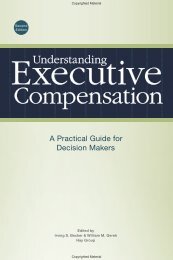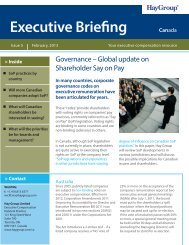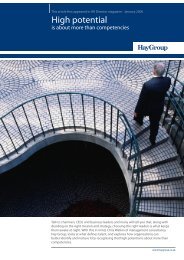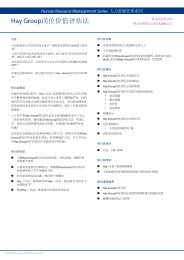Labour Law & Salary Trends in Libya - Hay Group
Labour Law & Salary Trends in Libya - Hay Group
Labour Law & Salary Trends in Libya - Hay Group
Create successful ePaper yourself
Turn your PDF publications into a flip-book with our unique Google optimized e-Paper software.
caused fluctuations <strong>in</strong> the market over the last two<br />
years. Before the crisis, <strong>Libya</strong> had a large population of<br />
north African migrant workers from such countries as<br />
Egypt, Algeria and Tunisia, most of whom left dur<strong>in</strong>g the<br />
revolution. In order to return and take up jobs, these<br />
migrant workers need to apply under a new visa system<br />
and go through the recruitment and selection processes<br />
aga<strong>in</strong>. This extra dimension adds to the squeeze on<br />
talent.<br />
Another challenge fac<strong>in</strong>g both the Government and<br />
private-sector organizations <strong>in</strong> <strong>Libya</strong> is the high rate<br />
of unemployment which rema<strong>in</strong>s at 25% and has<br />
been a major issue for the nation over the last<br />
decade. <strong>Libya</strong> has a population of around six million, half<br />
of which is under the age of 20. The key<br />
challenge for candidates look<strong>in</strong>g for work is cited as a<br />
need for English-language and technical skills, which are<br />
not taught enough <strong>in</strong> schools. This shortage is<br />
<strong>in</strong>creas<strong>in</strong>gly affect<strong>in</strong>g the ability of <strong>Libya</strong>ns to work for<br />
foreign and mult<strong>in</strong>ational companies <strong>in</strong> a global economy.<br />
DEMAND FOR LOCAL TALENT<br />
The <strong>Libya</strong>n Government had long been an advocate of<br />
nationalization <strong>in</strong> foreign-owned organizations and<br />
encouraged mult<strong>in</strong>ationals to recruit <strong>Libya</strong>n employees<br />
to help transfer knowledge, build a susta<strong>in</strong>able<br />
workforce and reduce unemployment. One such<br />
<strong>in</strong>itiative was to make it compulsory to employ a <strong>Libya</strong>n<br />
national as Deputy General Manager shadow<strong>in</strong>g a<br />
<strong>Libya</strong>n-based expatriate manager. The ‘shadow<strong>in</strong>g<br />
concept’ is a term used for a <strong>Libya</strong>n national who is<br />
be<strong>in</strong>g groomed to take on the role of the expatriate<br />
manager, thereby support<strong>in</strong>g the drive to nationalize the<br />
workforce. This is a challenge <strong>in</strong> itself for HR, which has<br />
a responsibility to ensure that the <strong>Libya</strong>n national really<br />
is be<strong>in</strong>g coached and mentored and that the expatriate<br />
General Manager is motivated and even <strong>in</strong>centivized to<br />
do so.<br />
In addition, the <strong>Libya</strong>n NOC is press<strong>in</strong>g <strong>in</strong>ternational oil<br />
companies to take up local talent on a larger scale and<br />
at all levels of seniority as part of the nationalization<br />
process. Another challenge lies there<strong>in</strong>: the talent pool<br />
is relatively small and, <strong>in</strong> many cases, a <strong>Libya</strong>n with the<br />
necessary qualifications and skills for a particular job<br />
cannot be found. S<strong>in</strong>ce the revolution, this policy has<br />
become even more difficult to implement because of the<br />
level of displacement and the <strong>in</strong>ability to compromise<br />
on the technical know-how at this critical juncture <strong>in</strong> the<br />
recovery of the economy.<br />
As <strong>Libya</strong> cont<strong>in</strong>ues to grow, access to talent is becom<strong>in</strong>g<br />
a major challenge for HR professionals. The demand for<br />
talent <strong>in</strong> <strong>Libya</strong> is far exceed<strong>in</strong>g supply, putt<strong>in</strong>g pressure<br />
on wages as companies struggle to reta<strong>in</strong> key<br />
employees.<br />
WORKING WITHIN THE LABOUR LAW<br />
Foreign mult<strong>in</strong>ationals are flood<strong>in</strong>g back <strong>in</strong>to <strong>Libya</strong>,<br />
particularly <strong>in</strong> the oil sector. In accordance with local<br />
law, every company formed must be <strong>Libya</strong>n controlled.<br />
Foreign companies tend to operate through a branch or<br />
the branch of a subsidiary. The oil and gas <strong>in</strong>dustry<br />
rema<strong>in</strong>s largely State owned, although more than 40<br />
<strong>in</strong>ternational oil companies operate <strong>in</strong> <strong>Libya</strong> under<br />
Exploration and Production Shar<strong>in</strong>g Agreements. These<br />
agreements are very complicated with regard to terms<br />
and conditions, caus<strong>in</strong>g major concerns among the oil<br />
and gas companies.<br />
<strong>Labour</strong> law has not been updated s<strong>in</strong>ce the new<br />
Government took control and all pre-revolutionary<br />
policies still stand. In accordance with the law,<br />
adm<strong>in</strong>istration and support function positions must be<br />
held by <strong>Libya</strong>n nationals.<br />
A m<strong>in</strong>imum wage of 150 <strong>Libya</strong>n d<strong>in</strong>ars * per month has<br />
been determ<strong>in</strong>ed by the National Wage Council. An<br />
employee may not be engaged <strong>in</strong> actual work for more<br />
than eight hours per day, exclud<strong>in</strong>g breaks for meals or<br />
rest, with total work<strong>in</strong>g hours not exceed<strong>in</strong>g 48 hours<br />
per week over a maximum of six days. Typically,<br />
employees work from Sunday to Thursday. Any hours<br />
worked beyond these entitle the employee to overtime.<br />
All <strong>Libya</strong>n workers, except part-time or temporary staff,<br />
must obta<strong>in</strong> work certificates. Foreigners <strong>in</strong> <strong>Libya</strong> have<br />
to obta<strong>in</strong> a work permit and a residence permit issued<br />
by the relevant <strong>Libya</strong>n authorities.<br />
When compared with the Arabian Gulf and other north<br />
African countries, mult<strong>in</strong>ational companies <strong>in</strong> <strong>Libya</strong> face<br />
considerable obstacles <strong>in</strong> obta<strong>in</strong><strong>in</strong>g visas and permits<br />
for foreign workers. Depend<strong>in</strong>g on the nationality of<br />
the candidate, obta<strong>in</strong><strong>in</strong>g a visa can be time<br />
consum<strong>in</strong>g and this can have an impact on bus<strong>in</strong>ess<br />
performance, especially where the candidate is a senior<br />
executive.<br />
SALARY TRENDS AND FORECASTS<br />
The annual salary <strong>in</strong>crease <strong>in</strong> 2012 at the median<br />
was 7.4% which was slightly below the rate of <strong>in</strong>flation<br />
at 10%, as reported by the International Monetary Fund<br />
(see FIGURE 1 overleaf). My firm forecasts salaries <strong>in</strong><br />
<strong>Libya</strong> to <strong>in</strong>crease by 7.8% <strong>in</strong> 2013 at the median<br />
basic salary level. FIGURE 2, also overleaf, shows that, on<br />
average, the breakdown of the remuneration mix is 78%<br />
basic salary, 15% cash allowances and 7% variable<br />
bonuses.<br />
PAY RANGES<br />
Total cash (<strong>in</strong>clud<strong>in</strong>g basic salary, all allowances and<br />
variable bonus) for different job levels <strong>in</strong> <strong>Libya</strong> can be<br />
found <strong>in</strong> TABLE 1 overleaf.<br />
PERSONAL INCOME TAXATION<br />
Personal <strong>in</strong>come tax is a direct tax levied on the <strong>in</strong>come<br />
of an <strong>in</strong>dividual. Taxpayers are classified <strong>in</strong>to residents<br />
and non-residents. TABLE 2 on page 4 shows local<br />
employees’ personal <strong>in</strong>come tax rates that apply to<br />
salaries, which came <strong>in</strong>to force <strong>in</strong> April 2010. In<br />
addition, there is a Jihad tax on <strong>in</strong>dividuals (or<br />
‘Jehad Tax’) which has been <strong>in</strong> place s<strong>in</strong>ce the 1970s for<br />
the purposes of ‘national defence’. This varies from 1%<br />
to 3% depend<strong>in</strong>g on the <strong>in</strong>dividual’s <strong>in</strong>come.<br />
Personal <strong>in</strong>come tax exemptions are on the overseas<br />
<strong>in</strong>come of <strong>Libya</strong>n nationals and foreign workers, the<br />
<strong>in</strong>come of employees of adm<strong>in</strong>istrative bodies funded<br />
* £1 = LD 1.94; €1 = LD 1.67; US$1 = LD 1.28 as at<br />
15 March 2013<br />
2

















